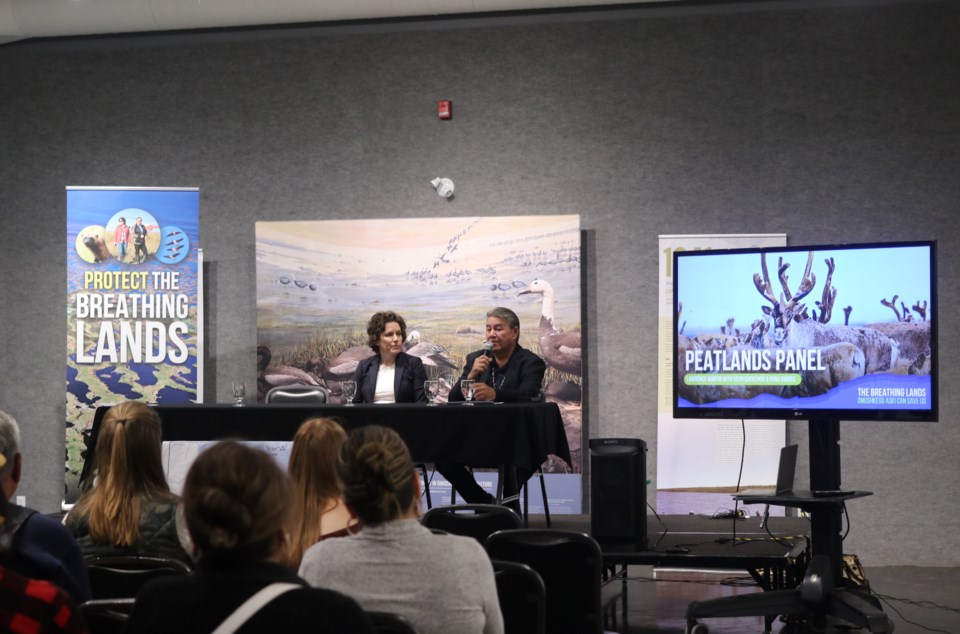The second largest carbon sink on earth is everyone's responsibility.
That message was delivered at the Breathing Lands Omushkego Aski Can Save Us presentation at the Timmins Museum: NEC on Sunday afternoon as residents learned more about the peatlands in Northern Ontario.
"We knew that we had to get the word out to draw attention and build the education around it because it's so important," said Anna Baggio, Wildlands League's conservation director. "Timmins is only about 200 kilometres from the Hudson Bay lowland, so you're not far."
Omushkego Aski is the Cree translation for the breathing lands, which are ancient peatlands in the Muskegowuk Territory in the Hudson Bay lowlands.
Wildlands League is a Toronto-based conservation organization that works with communities, governments, First Nations, scientists, and progressive industry to find ecologically responsible solutions.
The more work and awareness that is done, said Baggio, the more people realize how important the peatlands are.
"Scientists are telling us that it's just as important as the Amazon," said Baggio. "And so we need to take care of this ecosystem and really support Indigenous-led conservation."
This is the third event of this kind for organizers from Mushkegowuk Land and Resources and Wildlands Society.
A section of the Hudson Bay lowlands stretch across Northern Ontario. It works as a natural water filter for the area's rivers and is the second-largest carbon sink in the world.
"These first steps, we'll continue telling the story," said Lawrence Martin, Mushkegowuk Marine Region manager.
He said that the peatlands' importance must be discussed with industry before projects get started.
"There's no opportunity to discuss possibly working together and being able to gear mining plans accordingly to protect the environment in such a way that it will not cause great disaster," he said. "There's an opportunity for the federal government, the government of Ontario, First Nations, and mining companies can sit down and iron this out and make a plan together; I think that's the ideal."
An awareness of the lands around Northern Ontario is a key factor in protecting those areas, said Vern Cheechoo, interim executive director of Mushkegowuk Council.
"People can know what's in their backyard and how important and how rich the ecosystem is, compared to what might happen negatively if we don't do anything about it," said Cheechoo.
The Mushkegowuk Marine Conservation Plan has been working to build a conservation economy in the region.
"I think we bring opportunity through the conservation project and the PFP (project financing for permanence) funding we're getting to help with infrastructure, housing, all those kinds of things to try to address those social issues," said Cheechoo. "What we hope to do is create a conservation economy as opposed to an extractive industry."
He said that as he travels, looking for support, he sees a change in how the world views conservation.
"I was encouraged to see and hear that this is a global effort happening right now," he said. "There's a lot of investment and governments coming forward."
There are concerns that the Ring of Fire projects could disrupt the carbon trapped in the region's peatlands.
Local conservationist Lauren Robichaud, who helped bring the presentation to Timmins, said the region needs honest conversations about how the mining industry moves forward.
"To me, there is a message being shared with the community because we are a mining community, and we're talking the Ring of Fire, so to me, it was important to bring this story home," he said.
Breathing Lands presentations have now been held in Toronto and Timmins, with future events expected for Windsor and Thunder Bay.
"We're just trying to figure out how to do that," said Baggio. "We hope people walk away and go, 'We have something just as important as the Amazon right in our backyard!' and it's an incredible place for birds, for fish, for caribou, for polar bears."
The work to get the message out about the peatlands will be a long job, said Lawrence Martin.
"The Amazon didn't happen overnight either, and they still have to fight to protect it, so even if you get to a stage of protection with the peatlands, you still have to maintain that; you can't just ease back and sit on your chair and say, 'okay I did it,'" said Martin. "No, that's when the real work happens."
Cheechoo agreed but said that he's seeing more and more partners committing to climate action during that work.
"Bringing this to the attention of people not just in Ontario, in Canada and other parts of the world, that we do have the second largest carbon sink in the world, and it needs to be protected for all of us," he said." The more people know about it, the more they’ll understand what this area does and why it's so important."




